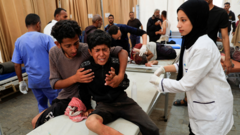Amidst Israeli missile strikes, residents of Tehran experience fear and uncertainty as they grapple with the escalating conflict, the toll on civilians, and their own conflicting feelings toward the Iranian regime and Israel.
Tehran Residents Voice Fear and Confusion Amid Escalating Conflict

Tehran Residents Voice Fear and Confusion Amid Escalating Conflict
As Israeli attacks unfold, Iranians in Tehran express a blend of shock, anger, and despair about the situation.
Tehran is under siege as its residents confront a new reality following the onset of Israeli missile strikes that started early Friday. The streets are inundated with long lines at gas stations and bakeries as people scramble for supplies, while many attempt to flee the capital amidst rising panic. Interviews with locals reveal stark emotional turmoil; residents oscillate between dread of violence surrounding them and feelings of betrayal by their own government.
"I haven't slept in nights," shared a 21-year-old music student, using an encrypted app to express her fears. Citing familial values, she describes her decision to stay in her home despite the conflict, stating, "It's more honourable to die in your own house than to run away." The student, who uses the pseudonym 'Donya,' articulates a widespread sentiment as she worries about her beloved city potentially facing destruction akin to Gaza.
The emotional landscape in Tehran paints a picture of confusion and conflicting loyalties. Netanyahu's calls for popular uprisings against the Iranian government resonate with some, while others firmly reject foreign involvement, declaring that "no country ever cared for Iran." Meanwhile, stories of collateral damage emerge, with unintentional casualties lingering in the minds of many residents. A woman, initially feeling a sense of vindication at the targeting of Iranian military officials, quickly shifted to anguish upon learning of civilian deaths.
Recent reports indicate over 220 fatalities in Iran, mostly among women and children, while at least 24 lives were claimed in Israel due to Iranian missiles. In stark contrast to Israel's structured alerts and shelters, Iranian civilians find themselves with little warning and no means of protection. This sense of vulnerability breeds panic as missile threats loom unpredictably.
Nights for many Tehran residents have become a source of compounded dread; despite government advice to seek refuge in mosques and underground metro stations, the unpredictability of attacks renders these options ineffective. One young woman reflects, "Tehran is a big city, yet every neighborhood feels the damage."
The current conflict has fractured public sentiment, igniting debates about the regime, the response to attacks, and individual safety. As residents attempt to navigate an environment rife with uncertainty and fear, they prepare for possibilities of worsening conditions, packing essentials in case they need to escape.
As Iranians abroad watch closely, many feel a wave of sympathy for civilians caught in the crossfire. Dorreh Khatibi-Hill, a women’s rights activist in the UK, highlights the complex emotions surrounding both the loss of regime members and the tragic reality of civilian suffering, stressing that "none of us wants this war." The announcement of new violence weighs heavy on the hearts of Iranians, who wish to avoid a descent into chaos similar to recent conflicts in Iraq, Syria, or Afghanistan.






















